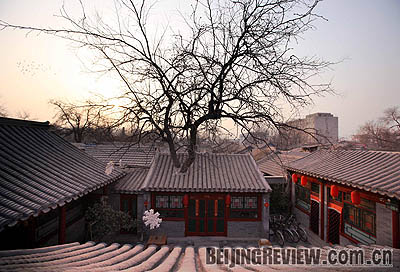By Valerie Sartor
Every month Beijing seems spiffier, hipper and more similar to other cosmopolitan cities. The magnificent 12th century Mongol capital, once known as Dadu, is undergoing tremendous renovations as China's economy booms.
|

|
|
The preservation of famous courtyard houses has become a growing public concern amid the building boom in the Chinese capital. |
Certainly, no one is complaining about the new subway lines and Terminal 3 at Beijing Capital International Airport. Residents like the ultramodern buildings displaying China's wealth and sophistication to the world, but many complain about the "Disneyification" of areas meant to attract tourists.
Beijing, as reconstructed throughout the 15th and 16th centuries, still remains the best example of traditional Chinese town planning despite the makeover. The real question revolves around whether Chinese culture will become extinct together with fast disappearing Chinese courtyards. Increasing pressure for urban development is causing Beijing to raze these ancient homes in favor of modern skyscrapers that yield higher profits and greater floor area ratios.
Throughout China, ancient homes had many similarities that cut across geography and economics with similar layouts for the rich and poor, both in earlier and later times. Although styles differed somewhat to accommodate the weather and terrain, certain materials and techniques, such as pounded earth foundations, timber framing, and the use of bricks and tiles, were ubiquitous. Furthermore, the ancient emphasis on orientation, layout and symmetry had retained its principal characteristics despite repeated foreign invasions-military, intellectual and spiritual-for thousands of years. Only recently has this ancient emphasis been ignored and discarded.
"Both location and building materials were thought to redirect beneficial energy for the dwellers," my colleague, He Shan, said. "Earth and wood, the two most common materials, are positive and auspicious. If you study a traditional home, you'll find that the bay numbers are always odd, because it's luckier. Much thought went into building Chinese homes."
She explained that houses were added on to systematically. For example, a three-bay house extension became a courtyard dwelling, with one extended family sharing this space.
"Of course, courtyard houses varied in size, depending on wealth and family taste, He said. "But generally these compounds had an inner courtyard and were built on a north-south axis. The door of the main building always faced south."
When I asked why, she explained that sunlight and prevailing winds, especially cold Siberian gusts, had compelled the Chinese as far back as the Zhou Dynasty (c. 1100-221 B.C.) to build their homes on a north-south axis. Later, during the Tang (618-907) and Ming (1368-1644) dynasties, doorways to the east and west would lead into beautiful gardens, but everything was always fully enclosed by buildings and walls with the front gate as the only opening.
"The high windowless walls provided privacy and protection but more importantly they're cultural," He said. "We make a big distinction between the ‘inner' and the ‘outer' in our lives and relationships. Places on the inside, people you're in close relationships with, they're important, protected and cherished and not for public view. Foreigners complain that we create dangerous bottlenecks; we see it as safety."
Family hierarchy also mimicked the layout of courtyards. Rear buildings were designated for the most senior family members, because they were considered the most private spaces. They had more warm sunlight as well. Families tried to optimize the benefits and minimize risks from their natural environment by using fengshui as well as walls when building house and garden compounds. This ancient geomancy practice coordinates human interactions with living spaces and the environment by strategically placing charms, rocks, water and symbols to alter energy flows auspiciously.
"Screens were placed to divert evil spirits, because Chinese folk belief states that bad spirits can move only in a straight line," He said. "One of the most important spaces in Chinese homes was reserved for family ancestors. Our homes welcomed the dead as well as the living, unlike Western people. Rich or poor, traditional homes devoted a space to family ancestors. My parents have a small shrine; rich people may still build a hallway for ancestors."
"So what do you think about all the modern buildings going up everywhere in Beijing?" I asked her curiously.
She shrugged and looked pensive. "I cannot feel anything but proud of how far my country has come," He said. "Yet I yearn to keep our cultural heritage too. Living in a small apartment separated from my extended family is tough. I feel like I'm losing something important. At the same time, I'm a modern woman. Every time I visit a courtyard home, I'm amazed at the simplicity, practicality, efficiency and elegance.
"Chinese courtyards, like Chinese operas, remind me of how different we are from Western people. Our aesthetic is more pragmatic and complex. Just as Chinese operas incorporate many arts-music, classic literature, singing, dancing, painting and acrobatics-Chinese courtyards also integrate relationships, families, landscaping and Oriental mysticism, including fengshui and the I Ching. We must preserve this."
(Beijing Review October 17, 2008)